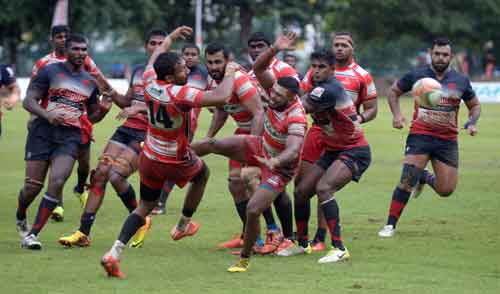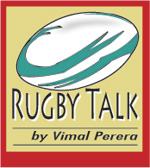League is as good as gone and now it’s the Knockouts
View(s):
Kandy has already won the League title, but CH has improved to challenge them in the Clifford Cup - File pic
What will happen at the knockout? Will there be ay surprises? Questions asked after the conclusion after the one-horse race for the Dialog League rugby crown. The surprise if any — can come from CH and FC who has played well despite the circumstances.
CH probably has the best chance of springing surprise. They are a team that is for quick release at the breakdown. Once with ball in hand they think to run into space or kick to space. They have a talented set of players supported by stars who do the finishing. With the joining of Sudharshana Muthutantri to combine with Yoshitha Rajapakse, who is having the best of seasons, CH will be the side to watch.
The Dialog Rugby league is in the last week with nothing to offer while the same old announcement of exciting rugby is aired. The cup to Kandy and a lift for CH is all there is unless Havelocks make Kandy to bite the dust on Monday.
In the Kandy-Army game there were around 15 injuries which lead to ask whether these players are adequately trained or are they over trained or shamming. High performance does not come from the number of hours at practices but from quality training. It is not only in this match but in many matches you see player injuries which may be serious, niggling or just feigning for a breather. It adds more to stoppages in games that have over 25 scrums which are a result of bad play.
Quick ball play is somewhat negated when others delay at the breakdown and get away with it. That is a problem that CH and FC faces.
They do have problems when the opposition is organised to get disorganised. Army is a set of spoilers and has little respect for rugby’s laws around the breakdown. What does it matter when you do so and get away with it? That is where the whistle should be and is important. Another side I have seen keeping behind the hind most foot is Air Force. That has taken them nowhere. Take the CH-Army game and when the inside and outside was policed adequately the game was better. CH did get what they wanted at the end but struggled as Army had to play and not be spoilers that use the non use of the law. What came about is that Army has the arsenal and can be another likely surprise in the knockouts.
What takes the mickey out of the game is the way it is played and exploited. Replicating without finesse what is seen on TV when world giants play. Look at what happens when the referee shouts “maul to get players to abide by the protocols. Same goes for the many other calls the referee makes.
The call however becomes a sign for the collapsing of the maul by the defensive side and then dive on it like it was a swimming pool but end as a playground pile-on. Players sit on the ball making sure it goes nowhere the referee blows up and gives a turnover to the defensive side.
It happens when the guy with the whistle is not in a position to see where the ball is and who is pulling. Some are still running around like a bitch in heat without stopping approaching and carefully watching and purposefully moving around. Take the Havelocks rolling maul that is collapsed. On the reverse Havelocks make use of the sacking and bring down after. Sacking before and after the maul is a thin line and requires the referee to be in place.
I heard this comment from a faithful who was commenting on the change of style by referee Cader who does less running. The advice was to run more. Unfortunately you may not be able to see the change of Cader a much vilified referee who has stuck to it despite all the criticism. Cader may not referee again and it is not because he was vilified or threatened as has happened many times but because he has been pumping on rugby grounds despite a less functioning heart. The column wishes him a speedy recovery.
The result of less attention to quick ball is the kind of mess you see in the game. How many times do referees shout ‘Hands, Back “etc in a match? It can be heard at almost every breakdown. It is as if players don’t know the rules. This only delays his thinking process and by the time they do what has happened has happened. The truth is, by the time a referee has shouted that twice, the damage – of slowing down the ball – has been done. And slow ball is useless at cracking the defense. A contest for the loose ball is one thing, killing it illegally is quite another.
 The next issue is that even if you get the ball there is nothing that can be done as the opposition is either fringing around or the outsides are up while the referees are still shouting and the focus is on the inside but again not on the ball. They keep barking as that is what coaches and the crowds want. I hear the repeated question. Did he warn? Look at the curving lack division while coaches make use of the lack of angle of vision. That is not the fault of the coach but he plays accordingly. Do not rush it aside saying it is a coaching problem.
The next issue is that even if you get the ball there is nothing that can be done as the opposition is either fringing around or the outsides are up while the referees are still shouting and the focus is on the inside but again not on the ball. They keep barking as that is what coaches and the crowds want. I hear the repeated question. Did he warn? Look at the curving lack division while coaches make use of the lack of angle of vision. That is not the fault of the coach but he plays accordingly. Do not rush it aside saying it is a coaching problem.
Communication is a message and not a shout. Under existing laws where this call is not a formal part of the game, it is still a very common convention used by referees to prevent.
In rucks or mauls where specific behaviour is expected in five seconds use it is acceptable in my view. Cut the cackle to few words or phrases. “Use it” (as the law indicate, not releasing, roll away on the full, captains, advantage, high or dangerous). All together seven phrases. Keep it simple and players and coaches will understand and you will have more time to think and the quick ball will be there.
In the question of quick ball I have seen two young referees paying attention with another getting there quick. But that does not matter to the distractor who have much to say probably not getting a head or tail of what the game needs. On the other hand their weak point is inability to position; move to spot and re position. It is not just refereeing form two sides. They know the law and can be a good for the game. But they will soon get into the shell playing safe to please the unmoved.
Vimal Perera is a former Rugby Referee, coach and Accredited Referees Evaluator IRB


